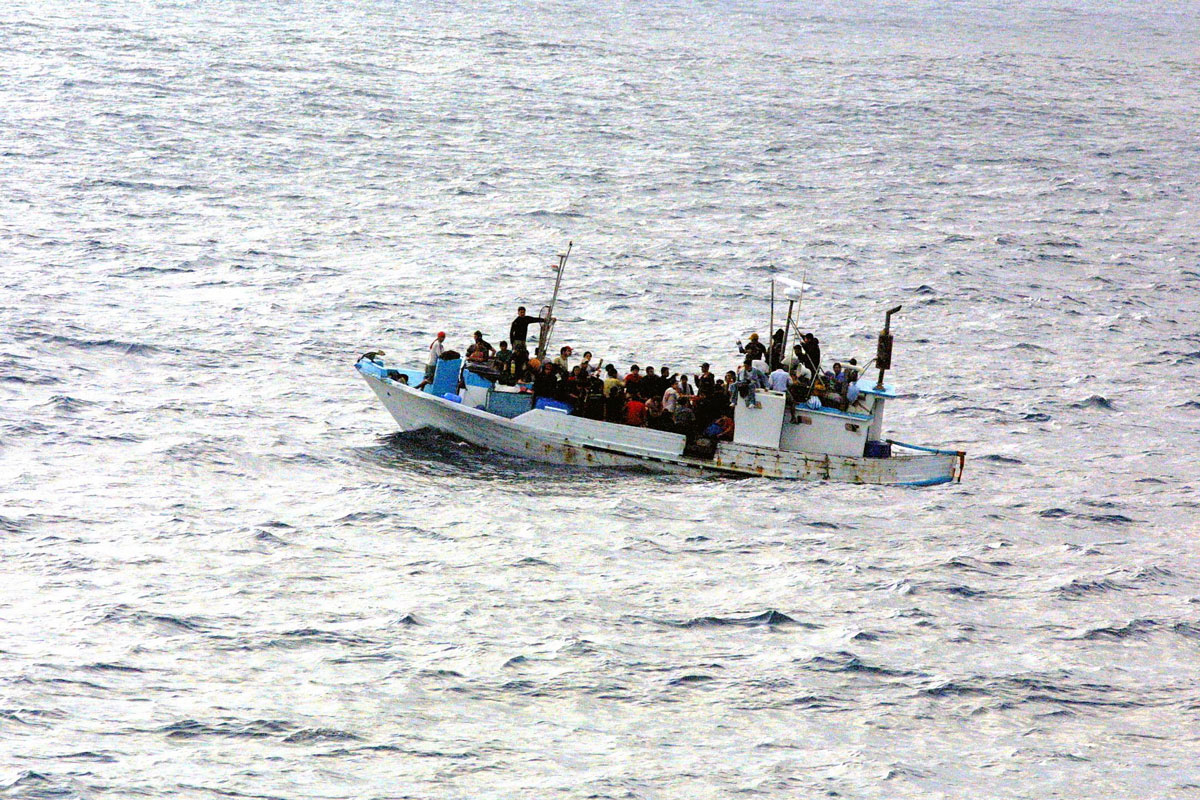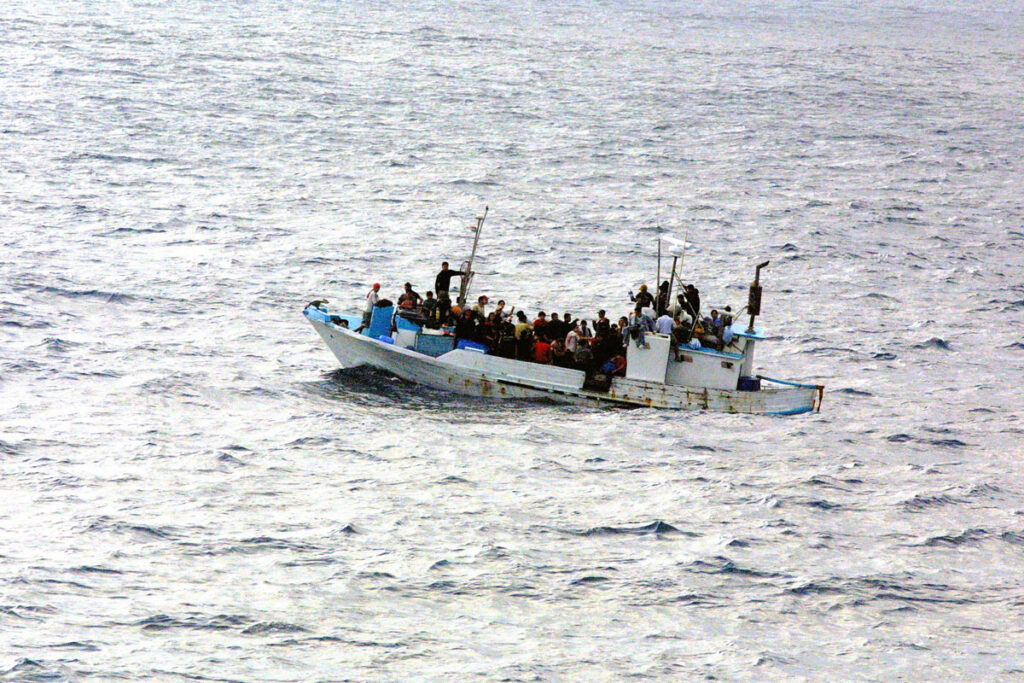A peace fellow is risking her life to work among women who have suffered at the hands of ISIS. ‘All I can do is tell their stories.’

She sends me her alias in a Skype message. Who she is, what she does, and where she does it make it too dangerous to use her real name. She is in Kurdish Iraq, in the northern part of the country, which is in the middle of so many battles, wars, and conflicts that it’s hard for outsiders — and sometimes even for local people — to keep track. But she has a focus amid the chaos: She works with Syrian and Yazidi refugees who have been targeted, tortured and driven out of their homes by the Islamic State.

The name she has chosen to use is Evin.
She is 32 years old. She is Kurdish too, although from Turkey, not Iraq, and she has close family ties with Yazidis. “They are Kurds too,” she says. The world knows little enough about Kurds; Yazidis are even more obscure, although they have been in the headlines in recent years. In Iraq, they numbered some 500,000, many of them living near Mount Sinjar, close to the Syrian border. Their religion is an ancient and syncretic one, with elements from Zoroastrianism, Mithraism and Islam. Some Yazidi practices resemble Muslim ones: They won’t eat pork, for example. But for centuries, Yazidis have been persecuted, mostly by Muslims, as “devil worshippers.”
Yazidis no longer live in the town of Sinjar, because there is hardly any Sinjar left to live in. When ISIS forces invaded it in August 2014, they massacred or enslaved whomever they could. Thousands of women were sold as sex slaves. The rest of the population fled, some to Mount Sinjar, where they have been sheltering ever since, suffering through brutal winter and hellish summer temperatures on the mountain. Many have died.
Evin’s route to her work with refugees has been a circuitous one. After earning a degree in humanities, she worked to highlight human rights violations against Kurds in the region known as Kurdistan, which encompasses parts of Iraq, Turkey, Syria and Iran. Then based in Turkey’s Kurdish region, she turned her focus onto huge dams that Turkey is building and their impact on people and the environment. She first visited northern Iraq to see how the dam-building was affecting the Tigris and Euphrates rivers, which descend from the Turkish mountains and flow through Syria and Iraq to the Persian Gulf. The Euphrates is already nearly dry.

Then, as the situation in Syria deteriorated, she began to work with humanitarian nongovernmental organisations as a translator. After meeting her fiancé, a Kurd from Syria who was living in Iraq, she went there to marry him and to live, and began to volunteer in the refugee camps to which thousands of Syrians and Yazidis have fled. She was trying to figure out how to continue her studies when a native Iraqi who was a 2014 graduate of the Rotary Peace Centre at Chulalongkorn University in Bangkok suggested she apply for a Rotary Peace Fellowship.
There was a problem, however: there was no Rotary club in Iraq to sponsor her. But Evin is resourceful. Her application was taken on by the Rotary Club of Asunción, Paraguay, and she was accepted. “The peace fellowship was a milestone in my life,” she says. She was captivated, first by travelling outside her region to a “whole new world,” and then by the people she met on the fellowship, who came from countries that she had only read about: Sri Lanka, Afghanistan, the United States. She travelled to Cambodia, where, having read about the Khmer Rouge, she met people who had suffered under the regime. “I learned so much,” she says, and she shared her own knowledge with the other students in the programme. “Kurdistan has so many difficult problems,” she explains, adding that outsiders aren’t aware of most of them. A teacher and peace fellow who promoted music as a peace-building mechanism, for instance, didn’t know that in Turkey, playing Kurdish music could lead to imprisonment.
LaMonte Adams is a lieutenant in the Philadelphia Police Department who studied with Evin at the Rotary Peace Centre. His first impression of her was of a quiet person and an intent listener. “I found that she will tell you exactly how she feels and what she thinks about a topic, yet she always does it in the most respectful way possible,” he says. “She will only engage in conversations when she has a relevant opinion that will enhance the discussion. She does not talk just for the sake of talking.”
By the end of the programme, Adams says, he considered her the “standout” among a group of talented peace fellows. “I could not have been more impressed by an individual,” he says. “She is deeply passionate about issues that relate to the lives of people in her community, but is also very concerned about people across the globe.”
Now, Evin works for NGOs and for journalists, setting up interviews and translating. She goes wherever she is asked, travelling to Syria three or four times a year and spending a lot of time in the camps with displaced Yazidis and Syrian refugees. Although there are schools and international organisations, she says, conditions are poor. People live in tents, which are hot in Iraq’s punishing summer and cold in winter.
She also works with the United Nations and other organisations to document the stories of Yazidi women and girls. “I am trying to do my best to tell anything they want to tell.” Evin recounts the story of a young girl whose experience was typical. Her village was overrun by ISIS, and the girl was raped. “They killed all the men; they took the women and children. Girls were sold in the bazaar.” Women who won’t sell are often killed. In Sinjar, recently retaken by Kurdish fighters, mass graves, including one where only older women were buried, have been discovered.
The buying, selling and mass rape of women and girls by ISIS has been well-documented, including by Human Rights Watch, which published a chilling report last year. ISIS has openly admitted that it uses enslavement and mass rape as a policy. Women are considered spoils of war.
But there’s another, coldly strategic reason for the selling of girls: They can be used to lure foreign fighters.
I ask Evin if it’s easy for the women to talk after so much trauma. “It depends on the woman,” she says. “Some are so strong.” Others are not. She translated for one woman who started laughing when she told how her brother was killed. Another, she recalls, “had been sold several times. She got pregnant. She had an abortion. She was telling me this, and at one point I stopped breathing. She touched my shoulder and said, ‘I’ll be OK.’?”
Evin knows her role is a sensitive one. “What upsets me,” she says, “is the approach of journalists who come here and try to make these women talk, to get the detail of how she was raped, just to get one side of the story and attract attention.” The stories can be told, she says, “but you can’t show her face or give her name.” Once, she says, after a girl was interviewed, her face clearly visible, her family — still in captivity with ISIS — was killed.
She feels strongly about the plight of the Yazidis, whom she calls “a peaceful people,” so she continues to live in northern Iraq despite conditions that have only worsened since she arrived. “It used to be safer and richer, here.”
These are turbulent times in a turbulent region. The UN calculates that ISIS still holds 3,000 Yazidis in captivity. More frightening for Evin is that ISIS wants to target Kurds too. “We met some ISIS prisoners and asked them who they are fighting against. They said, ‘We are fighting the infidels called Kurds. If we find one, we kill them.’?”
A year ago, one of her cousins, a young girl, was killed in Syria. “Murder and killing are a normal part of life here,” she notes. But earlier this year, a nephew also died there in an explosion. “My nephew was like my little brother. His death still really affects me.” She supports Kurds who travel to Syria to help. “They are fighting ISIS, which is the enemy of all humanity.”
One day, she will write all this down. She feels a responsibility to the women she meets. For now, she does her job and works on a master’s degree in history online. “There’s not much I can do but tell their stories and describe what they face.” When I ask her which women have inspired her most, she doesn’t pause for thought. “All of them.”
Reproduced from The Rotarian
SACHIN RANE
Area of focus : Promoting peace
Age : 49
Occupation : Detective inspector
Location : Mumbai
Peace Centre : Chulalongkorn University, Bangkok, 2013
Growing up in India, Sachin Rane dreamed of being a police officer like his father and grandfather. “Our walls were decorated with uniformed pictures of my ancestors,” he says. But he never imagined how far police work would take him. Rane became a Mumbai police officer in 1991. He investigated bombings, kidnappings and murders while working for a variety of law enforcement branches, including the Central Bureau of Investigation, the immigration unit, and the serious crimes unit. In 1999, he came across a federal government call for officers needed at the United Nations International Police Task Force. He was fascinated by the job description and the opportunity to work internationally. He applied and was sent to Kosovo.
There, Rane worked as a firearms instructor and helped train Kosovo’s nascent police force. Later, he was one of eight Indian officers chosen for a UN peacekeeping mission in Cyprus, which has been divided between Turkey and Greece since 1974.
In 2013, Rane was selected for a short-term Rotary Peace Fellowship at Chulalongkorn University in Bangkok. There, he studied international human rights law, security sector reform, theories of neutrality, racial discrimination, and the importance of neutral third-party intervention in conflicts. That year, Rane put what he learned into practice when he was selected to be a crime investigation officer at the UN Headquarters in Juba, South Sudan, a new nation still suffering from decades of civil war. The tensions between Dinka and Nuer groups kept everything on edge and often boiled over into violence. The demands of the job were high stakes.
“One day, I received a call to immediately rush to the site where a mob had held a person suspected of murdering his wife and child,” he recalls. “I responded and found a man tied to a wooden pole amid an angry mob trying to lynch him. I had to use all my diplomatic qualities to pacify the mob and prevent them from harming that suspect. I held the mob back successfully until reinforcements arrived and we could evacuate him safely for further legal action.”
Back in Mumbai investigating economic offenses like fraud, Rane is different today. “After the training that I received in the Rotary peace course, I have become more people-oriented rather than a rigid law enforcer,” he says. “I try to study the causes that lead to an incident.”
– Frank Bures









